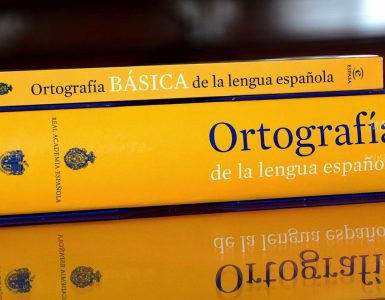Table of Contents
Saying stop in Spanish is as essential as learning to say thank you or please. It is one of the most useful and necessary expressions in Spanish slang, either to try to avoid a problem or accident or to indicate that “enough is enough” of something. In this post, I will teach you the different ways of saying stop in Spanish and in which situations or countries they should be used.
¡Para!/¡Pará! – Stop!
It is the most used and casual way of saying stop in Spanish, although it is also often heard in formal conversations. In Argentina, they say pará with stress on the final syllable. Another important detail is that para can also refer to the verb parir of giving birth or parar of standing up, but of course, this depends on the context of the conversation.
If we say: “Tenemos que presionar a Juan para que él para el dinero.” (we have to pressure Juan so that he gives birth to the money), we are intending to use the verb to give birth. Since it takes a lot of effort for a woman to give birth, it is an expression used in some countries such as Colombia and Venezuela to denote someone’s enormous effort to do or get something.
If we say: “Tenemos que presionar a Juan para que pare la hemorragia” (we have to put pressure on Juan to stop the bleeding), we would be talking about the verb parar meaning to stop, in this case “to stop the blood from the hemorrhage”.
Instead, if we say: “Tenemos que presionar a Juan para que se pare de la silla” (We have to press Juan to get up off the chair), we are talking about the verb “parar” to “stand up” or “get up”.
Returning to the use of para in the verb “to stop”, we have that if we refer to someone as usted, we use pare and if we refer to someone as vosotros, in some areas of Spain, we use parad.
| Spanish | English |
|---|---|
| Para de dibujar Mariana, que ya terminó la clase. | Stop drawing Mariana, the class is over. |
| Pare lo que está haciendo y preste atención. | Stop what you are doing and pay attention. |
| Os estoy diciendo que paréis de mirarme de esa manera. | I’m telling you to stop looking at me like that. |
¡Alto! – Stop!
More than an adjective and an adverb, ¡alto! is the way we usually order someone to stop, as well as indicating a temporary halt or pause in an action being performed.
| Spanish | English |
|---|---|
| ¡Alto ahí bandido! | Stop there bandit! |
| Los empleados hicieron un alto en la tarde para merendar algo. | The employees took a break in the afternoon to have a snack. |
¡Detente! – Stop it!
It is the most formal way of saying stop in Spanish. While detente can be used as a simple expression, it can also be conjugated to express other things, such as order and arrest. For example, when a policeman arrests someone, we can say lo detuvo, but this expression is limited to being seen in printed media such as newspapers or magazines and newscasts. When we are referring to the other person as usted, we use deténgase, while if we are using vosotros, in Spain, we say detengáis, in this way:
| Spanish | English |
|---|---|
| ¡Detente María! Casi te atropella un carro. | Stop it, Maria! You almost got hit by a car. |
| Señor, deténgase inmediatamente. | Sir, stop immediately. |
| Le ordeno que detenga su auto y me muestre su identificación. | I order you to stop your car and show me your identification. |
| ¡Estoy diciendo que os detengáis! | I’m telling you to stop! |
¡Basta! – That’s enough!
It is another expression that, like the previous ones, can be used singularly, although it is more frequently heard as ¡basta!, demanding the subject to immediately stop the action they are doing and which, depending on the tone of voice and facial expression, can also denote annoyance. Basta also has another meaning, because basta as an adjective, refers to something that has been made without refinement or in a coarse manner and can also refer to a basting stitch.
| Spanish | English |
|---|---|
| ¡Ya basta Julián, me estás lastimando! | That’s enough Julian, you’re hurting me! |
| Basta de jugar a la pelota por hoy | Enough playing ball for today |
¡Suficiente! – Enough!
It has the same function as basta but is a bit more refined, which is why we usually hear it in TV dubbing and animated series. It can be used in an exclamatory form or in sentences requiring someone to stop in all Spanish-speaking countries, like this:
| Spanish | English |
|---|---|
| Ya fue suficiente de esperar tanto tiempo aquí afuera. | Enough waiting out here for so long. |
¡Cálmate! – Calm down!
Although keeping calm refers to a state of tranquility and relaxation, the expression cálmate also works to say stop in Spanish. It is used in all Spanish-speaking countries, with the difference that we tend to hear it in everyday, informal settings.
| Spanish | English |
|---|---|
| ¡Cálmate tío! Que vais a romper la mesa a martillazos. | Calm down, man! You’re going to break the table with hammers. |
| Cálmate Joaquín, ni se te ocurra acercarte. | Calm down Joaquín, don’t even think of coming near me. |
¡Bájale dos! – Put two down!
This expression is also like cálmate since it can be used alone in an exclamatory form to express a stop, with the difference that it can also mean shut up. It is a Venezuelan colloquialism that has spread to other countries such as Colombia, Ecuador and Peru. It refers to the action of lowering the volume of a device because when this is required, we must stop what we are doing and turn the volume down on the device.
| Spanish | English |
|---|---|
| Bájale dos que no estoy hablando contigo. | Put two down, I’m not talking to you. |
¡Aguántalo! – Hold it!
Like bájale dos it is also used as an exclamation or in a sentence to denote order. It is used throughout Latin America and can also refer to the verb “to grab” or “to hold”. It is a way of saying stop in Spanish because when we hold something, we are stopping it from doing something specific. It is used a lot on buses when we want the driver to stop even though there isn’t a bus stop or he’s overshot the stop you wanted to get off at.
| Spanish | English |
|---|---|
| Aguántalo ahí antes de que se vuelva a ir a su casa. | Hold it there before he goes home again. |
| Aguántelo chófer, yo me quedo en Alta Vista. | Hold it, driver, I’m staying in Alta Vista. |
Tate’ quieto – Stay still
This expression is short for estate quieto (stay still) and is a Venezuelan colloquialism. It is used to reprimand disobedient or badly behaved children and make them stop behaving that way. Verbally expressed, it can also refer to putting an end to a specific situation or inciting a fight.
| Spanish | English |
|---|---|
| ¡Dale su tate’ quieto para que deje de gritar! | Give him a telling off so he’ll stop screaming! |
| Tienes que darle un tate’ quieto porque si no las cosas van a seguir igual | You have to give him a telling off because otherwise, things will stay the same. |
Dar un parao’ – Give a stop
Like tate’ quieto, it is a Venezuelan colloquialism that has spread to countries such as Colombia. It can refer either to ending or stopping a specific situation or to referring to a hit, with the difference that the context of both situations changes. The hit referred to in this situation describes a moral blow, such as a word or a discussion that puts an end to a conflict, in this way:
| Spanish | English |
|---|---|
| Ayer hablé con Juana y le di un parao’ | Yesterday I talked to Juana and gave her a stop (dressing down). |
While, on the other hand, it refers to situations of violence or abuse that must stop immediately, in which it is used thus:
| Spanish | English |
|---|---|
| Tienes que darle un parao’ a tu jefe para que no siga explotándote en el trabajo | You have to give your boss a stop (pull him up) so that he does not continue to exploit you at work. |
Final thoughts
Now that we have explained the different ways of how to say stop in Spanish and seen some nuances about the verbs used in these expressions, you should now be able to go away and practice them. Practice is the only thing that will allow you to identify the contexts of each conversation so that you know how and when to use each of these expressions.










Add comment